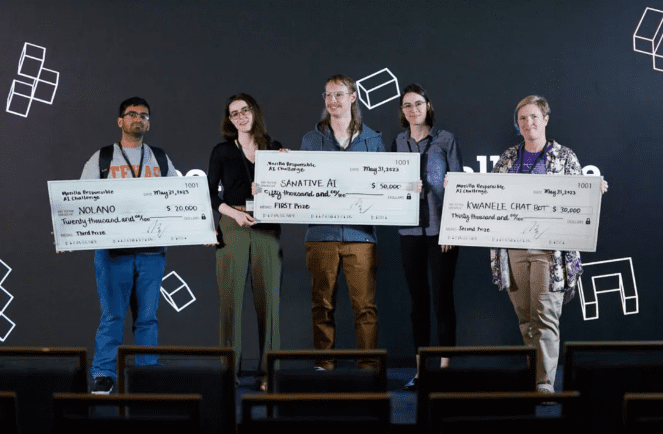- Mozilla’s “Responsible AI Competition” concludes with winners announced for innovative AI projects.
- Sanative AI wins the top prize of $50,000 for their anti-watermark AI solution, safeguarding images and artwork.
- Kwanele Chat Bot secures the second prize of $30,000, providing protection and assistance for women in aggressive communities.
- Nolano receives the third prize of $20,000 for its language model enabling local machine AI capabilities.
- Winners will receive mentoring, access to resources, and support from Mozilla.
TL;DR: Main AI News:
In a significant development, Mozilla recently concluded its highly anticipated “Responsible AI Competition,” an initiative aimed at fostering the ethical and socially responsible utilization of generative AI technology and large Language models (LLM). The winners of the coveted prizes have now been unveiled by the Firefox Foundation, and they will be rewarded with funding to bring their projects to the market.
The Mozilla Responsible AI Challenge, launched in March, represents a groundbreaking incubator program meticulously designed to propel AI solutions that benefit society as a whole, transcending the interests of profit-driven megacorporations or affluent individuals. With this initiative, the American Foundation sought to nurture commercially viable AI capabilities while simultaneously addressing the concerns of those who fear that this revolutionary technology might unleash an apocalyptic scenario of chaos and widespread unemployment in the near future.
Mozilla has officially announced the triumphant recipients of the Responsible AI Challenge, highlighting three projects that epitomize “ingenuity, innovation, and expertise” in the development of human-centric and trustworthy applications and commercial AI solutions. The foundation dedicated extensive weeks to evaluating a myriad of consumer technologies and generative AI offerings, fostering collaboration among global visionaries and entrepreneurs focused on creating superior products and fostering responsible business practices.
After an exhaustive deliberation process involving esteemed experts such as artificial intelligence scientists, developers, and entrepreneurs, Mozilla bestowed the grand prize upon Sanative AI, awarding the company an impressive $50,000. Sanative AI is revolutionizing the field with its pioneering “anti-watermark AI” solution, which safeguards images and original artworks from exploitation as training data for distribution models and generative AI algorithms.
Sanative AI’s groundbreaking “hostile artificial intelligence tools” serve as a formidable defense against abuse by AI applications, with its initial product offering an ingenious technology that applies a subtle layer of “visual noise” to any images uploaded online. While this noise has minimal, if any, discernible impact on the original images, it effectively confuses machine learning algorithms, resulting in distorted outputs.
Securing the second prize in Mozilla’s Responsible AI Challenge is the remarkable Kwanele Chat Bot, which garners $30,000 in recognition. Developed to protect women in aggressive communities, this cutting-edge technology offers swift access to assistance while ensuring the collection of admissible evidence, bolstering the fight against injustices faced by vulnerable individuals.
Lastly, Nolano clinched the third prize, receiving $20,000 for its innovative application of natural language processing in running LLM on local autonomous machines like laptops and smartphones. Leveraging state-of-the-art language models, Nolano enables efficient and reliable AI capabilities even without constant internet connectivity.
In addition to the monetary rewards, the three winners of the Responsible AI Challenge will benefit from invaluable “mentoring” by industry leaders in the artificial intelligence and technology sectors. Furthermore, they will enjoy ongoing access to Mozilla’s extensive resources and communities, empowering them to refine and advance their projects. Britney Crooks, Mozilla’s director of innovation and product strategy, emphasized that the evaluation process was designed to inspire all candidates, fostering their motivation to continue developing responsible AI solutions, irrespective of the competition’s outcome.
Conclusion:
The recognition of AI Watermark Protection Technology by Mozilla’s Responsible AI Challenge signifies a significant step towards promoting ethical and socially responsible AI solutions. The award-winning projects, including Sanative AI’s anti-watermark AI, Kwanele Chat Bot, and Nolano’s language model, demonstrate the potential for innovative applications that prioritize human-centric approaches. This development indicates a growing demand for AI technologies that serve broader societal needs rather than solely catering to profit-driven enterprises. As these projects receive support, mentoring, and access to resources, it is expected that they will further advance responsible AI practices and contribute to the evolving market of AI solutions.

